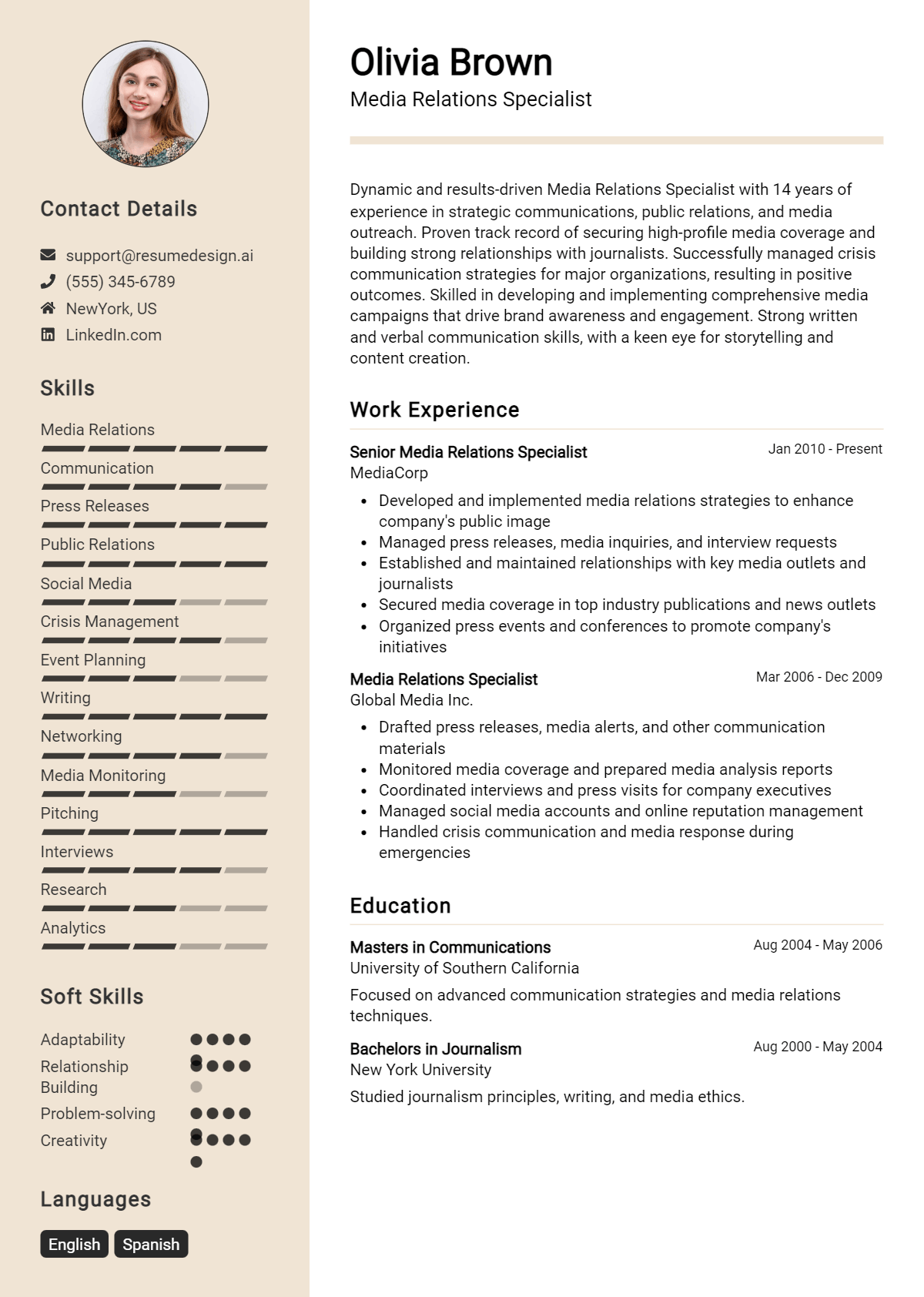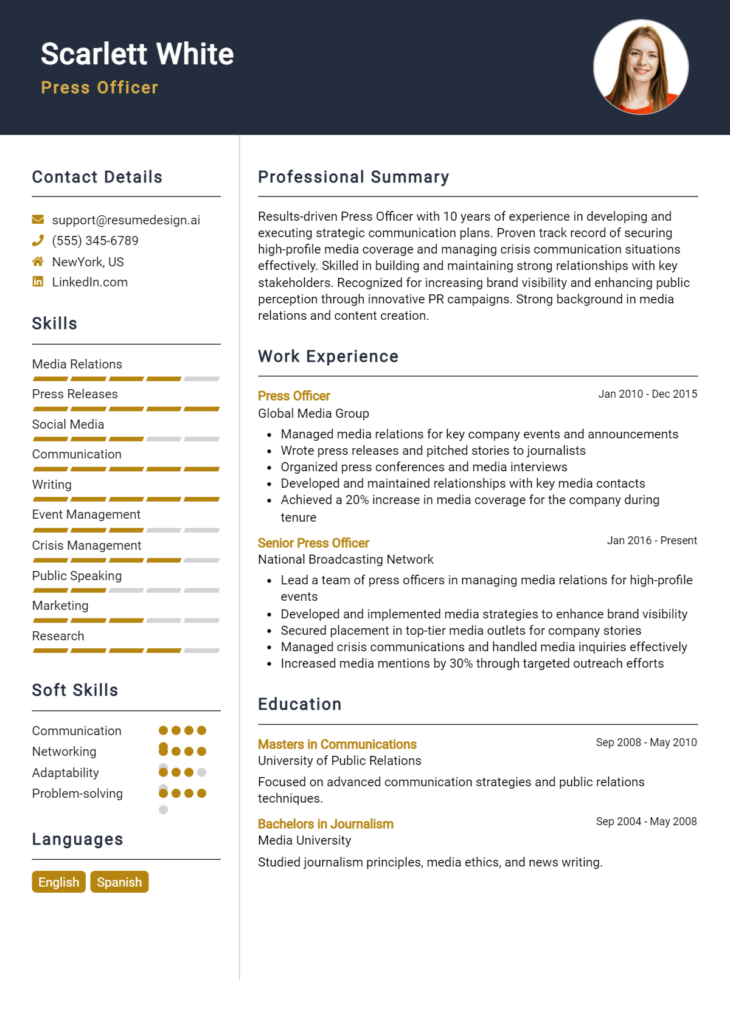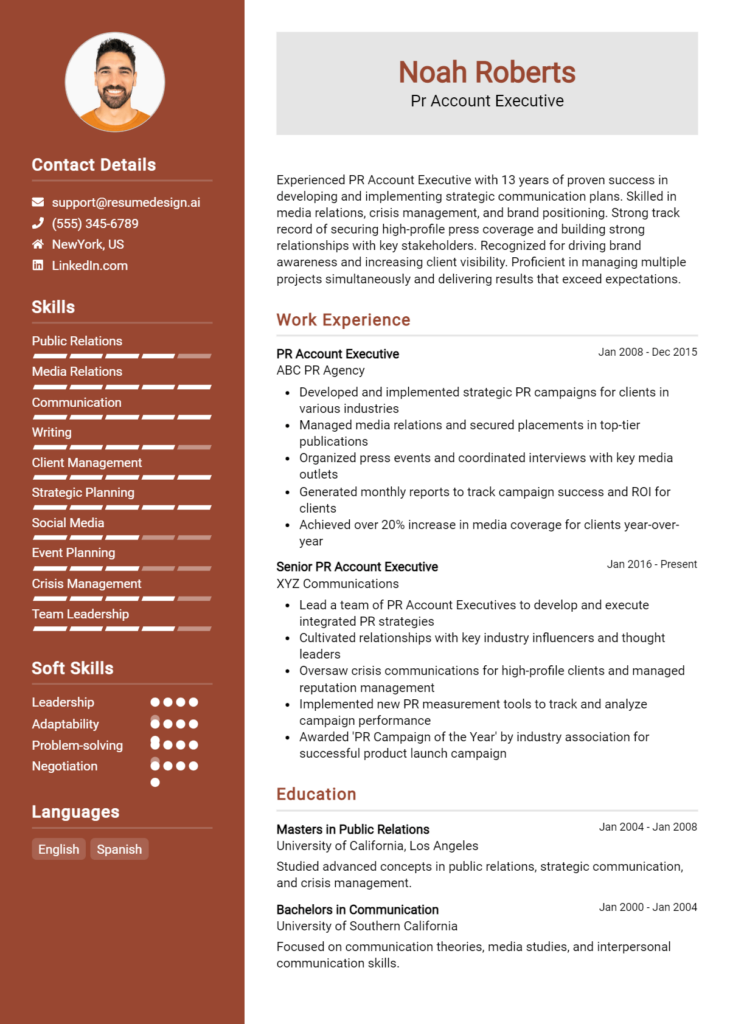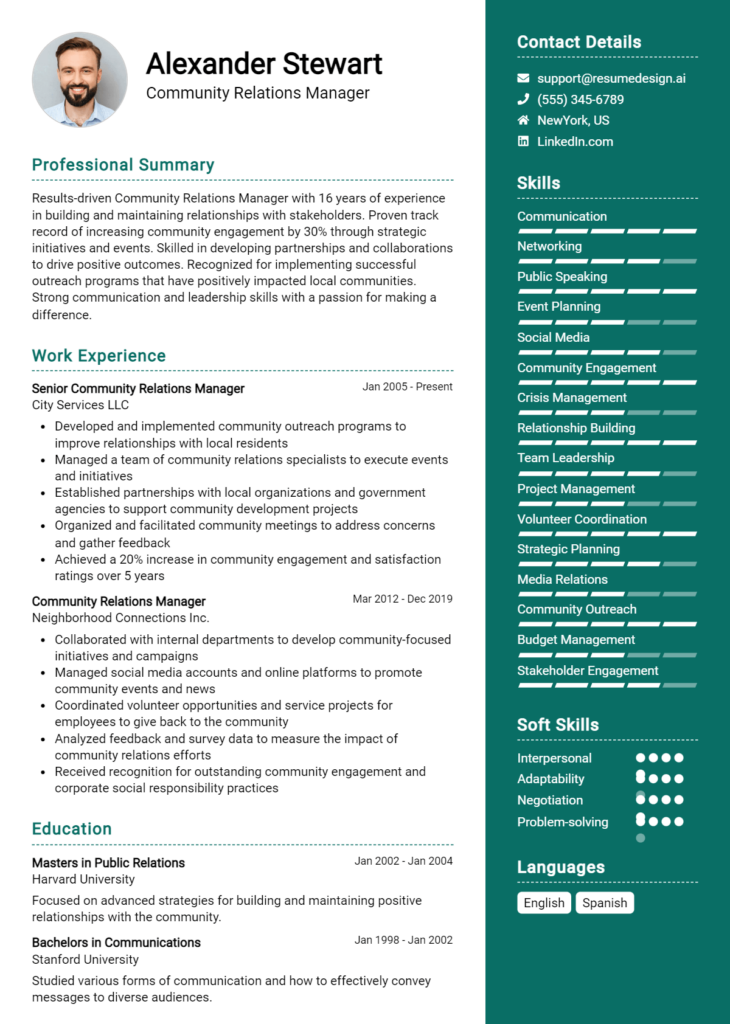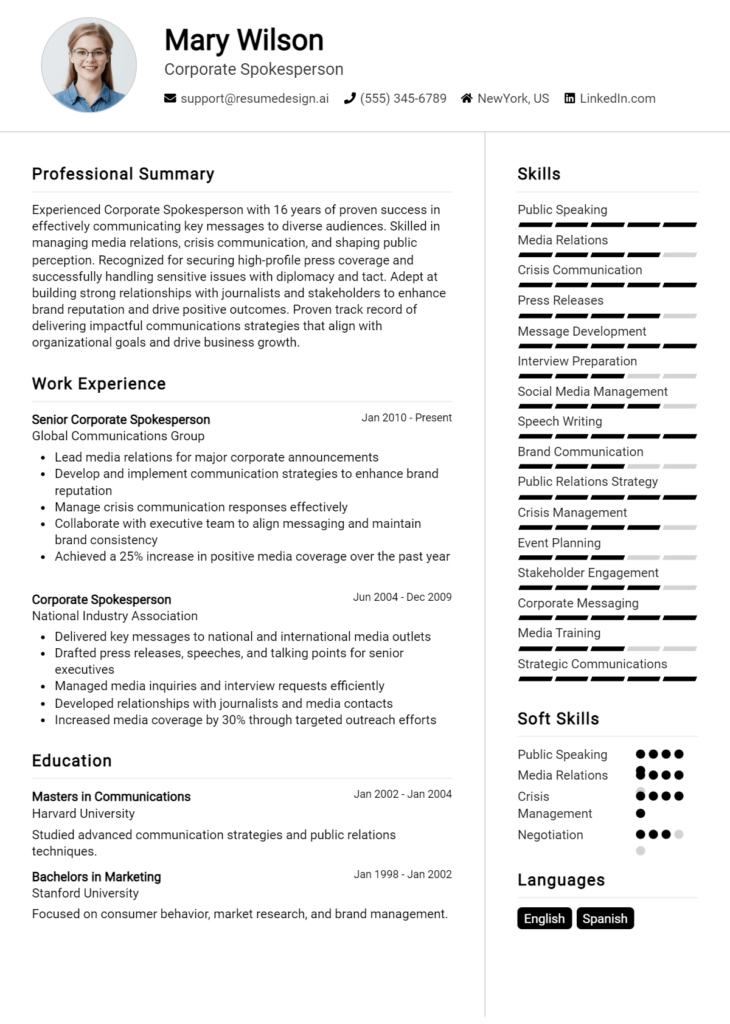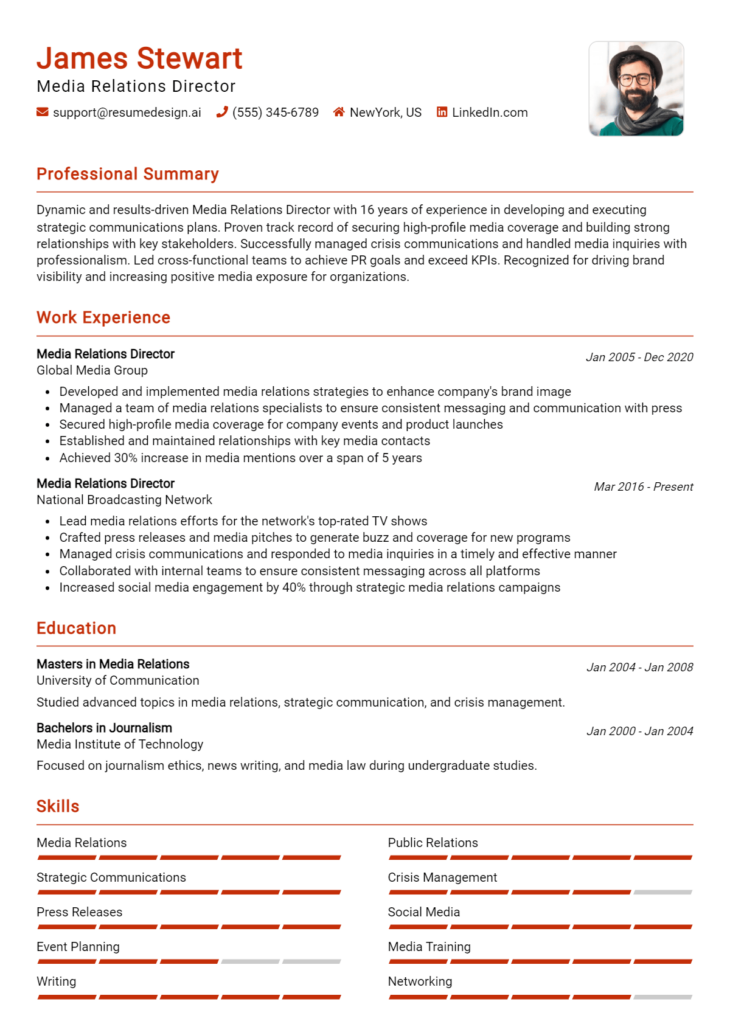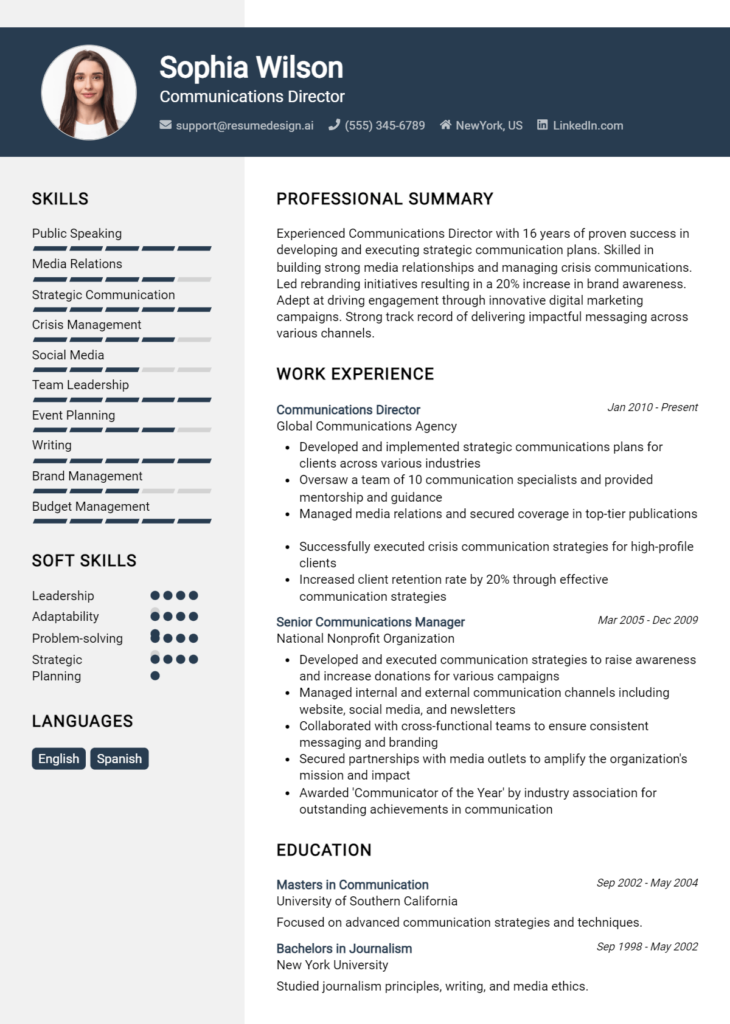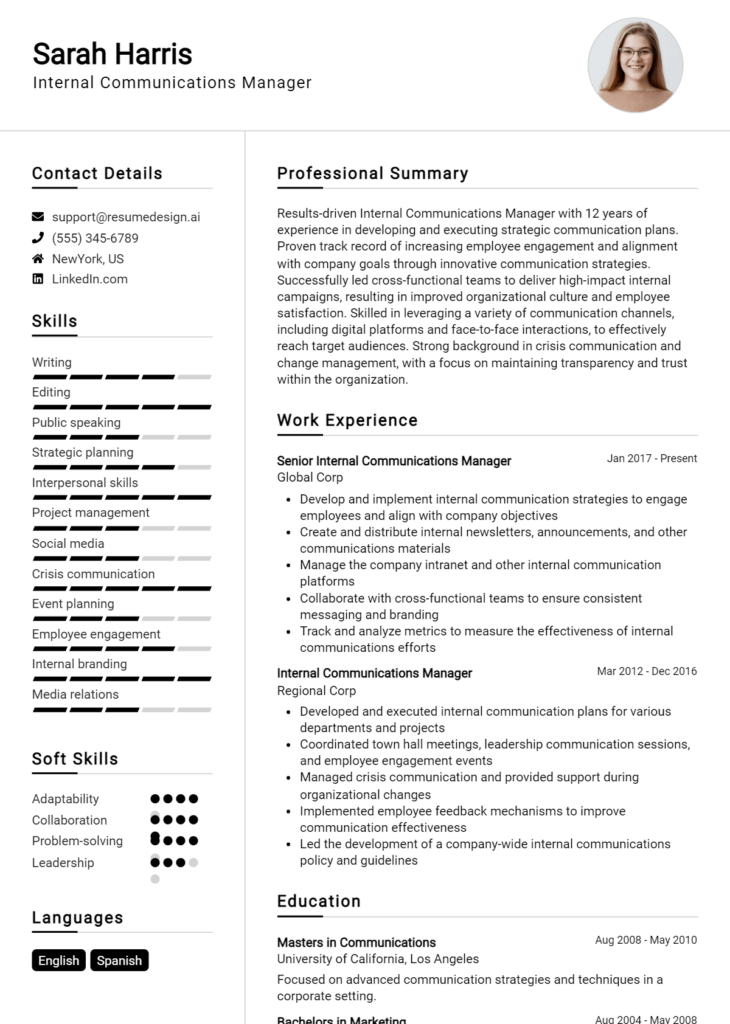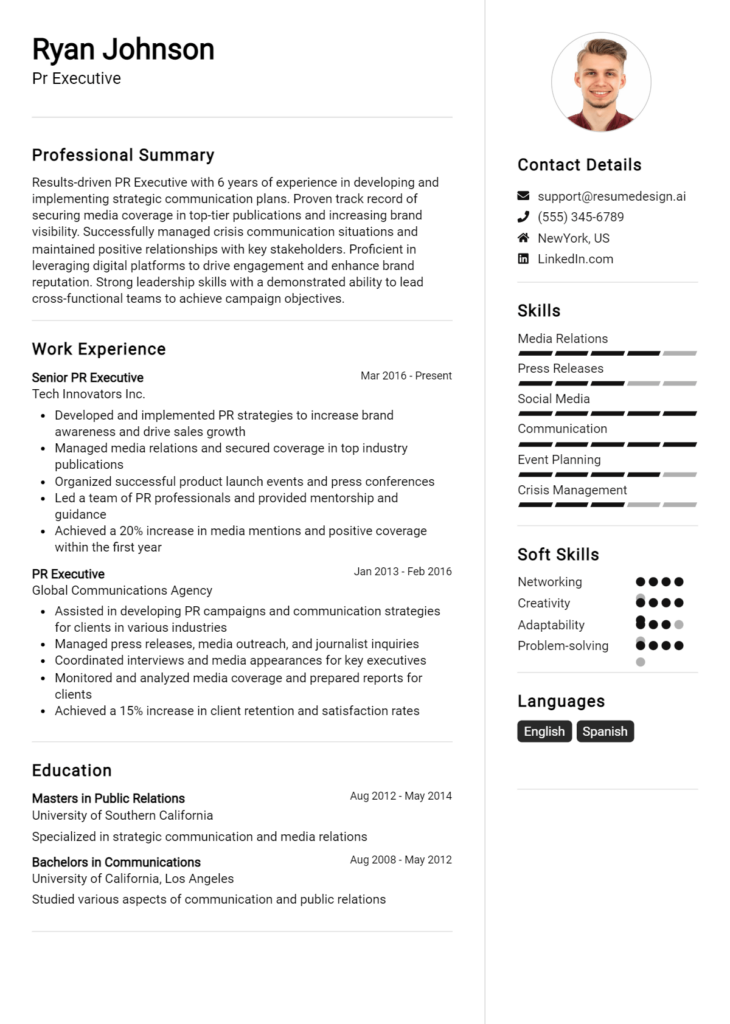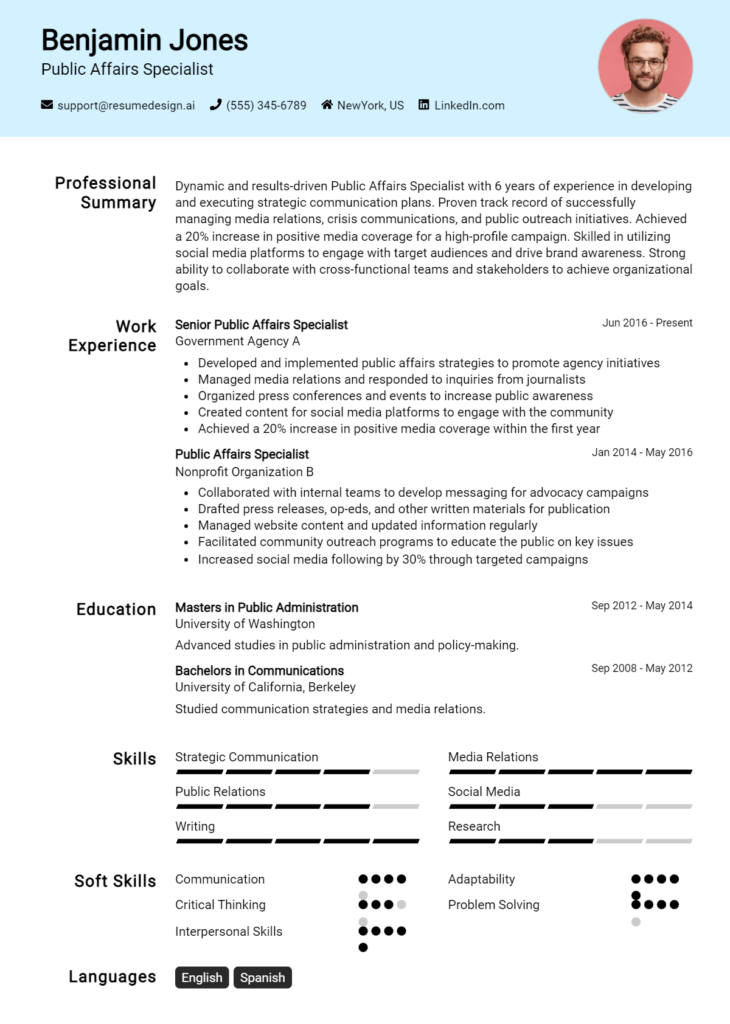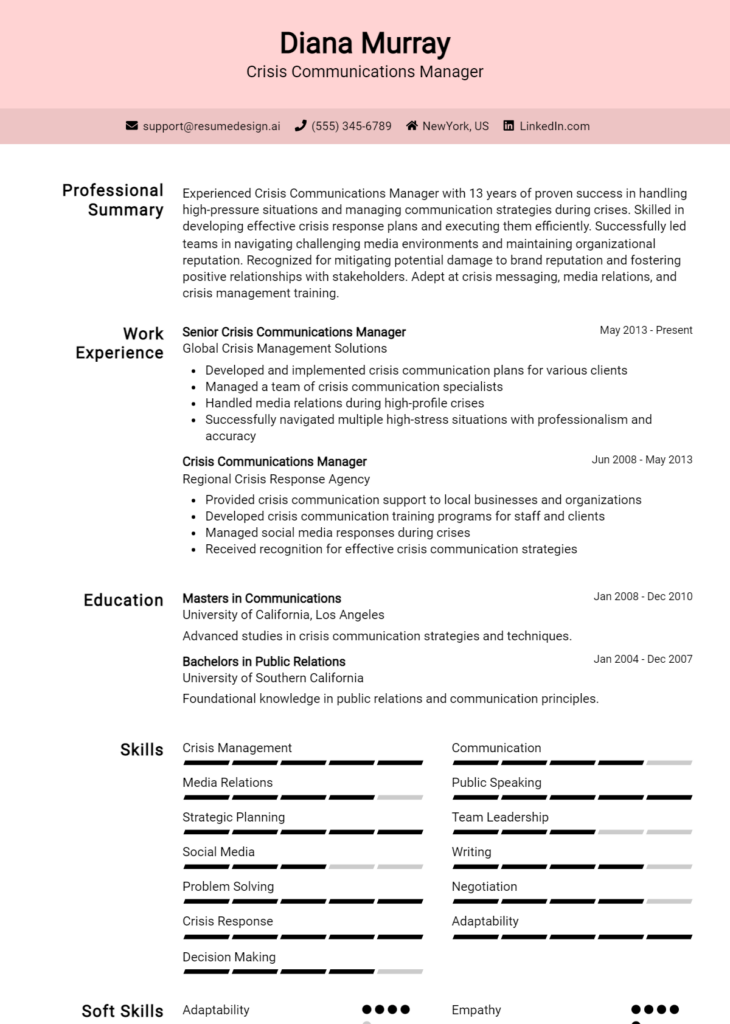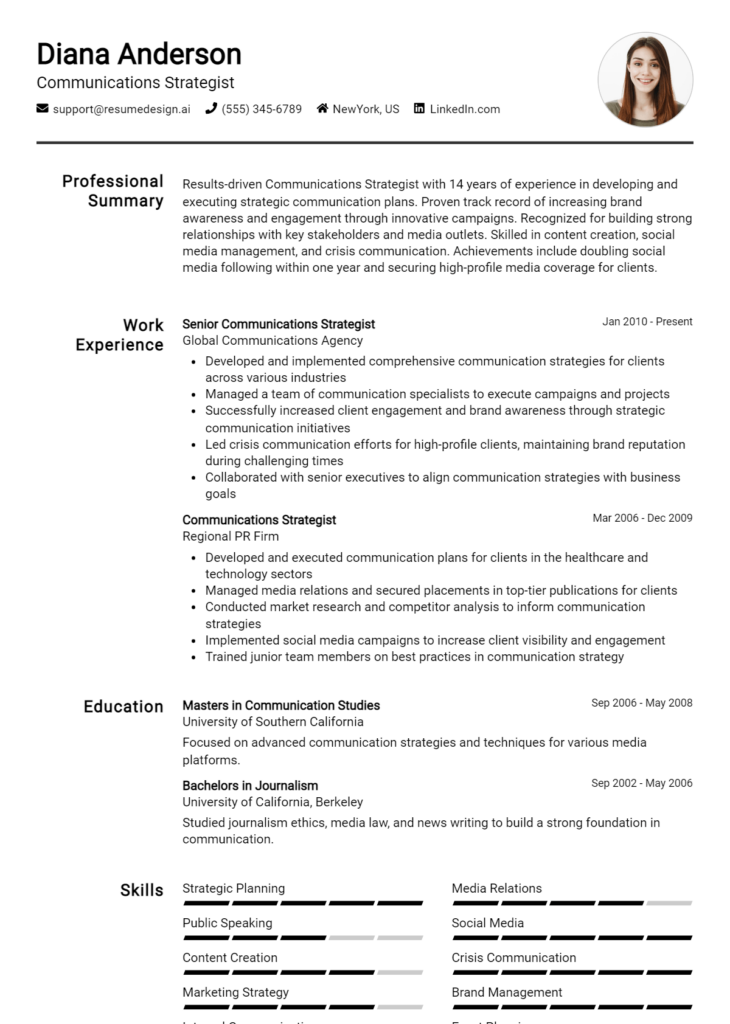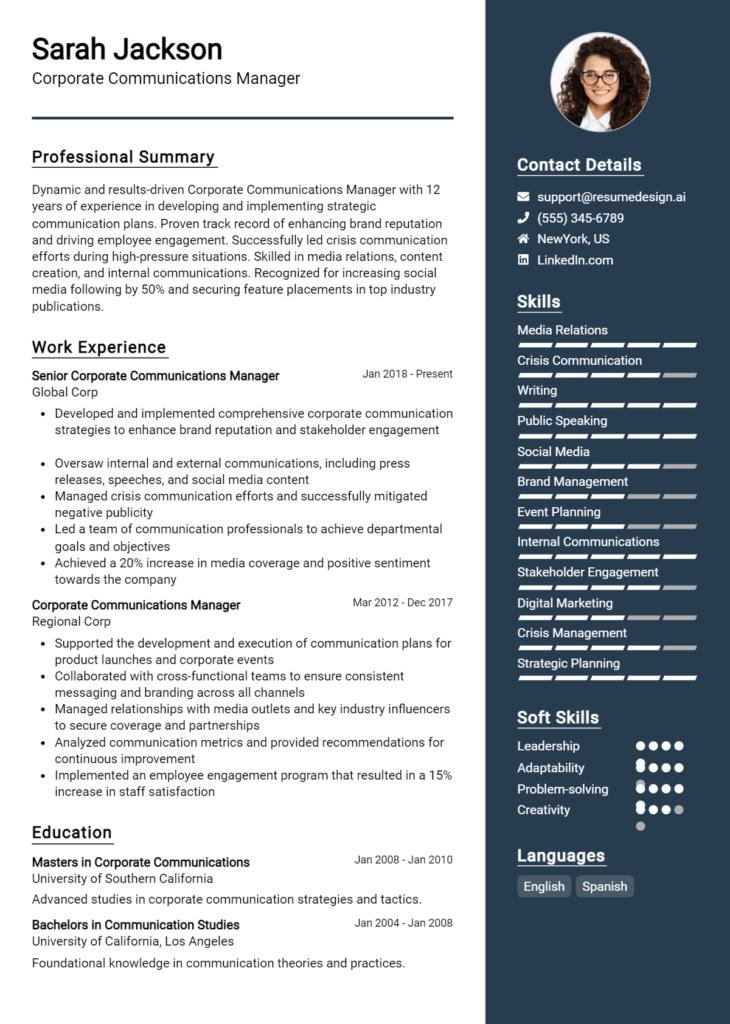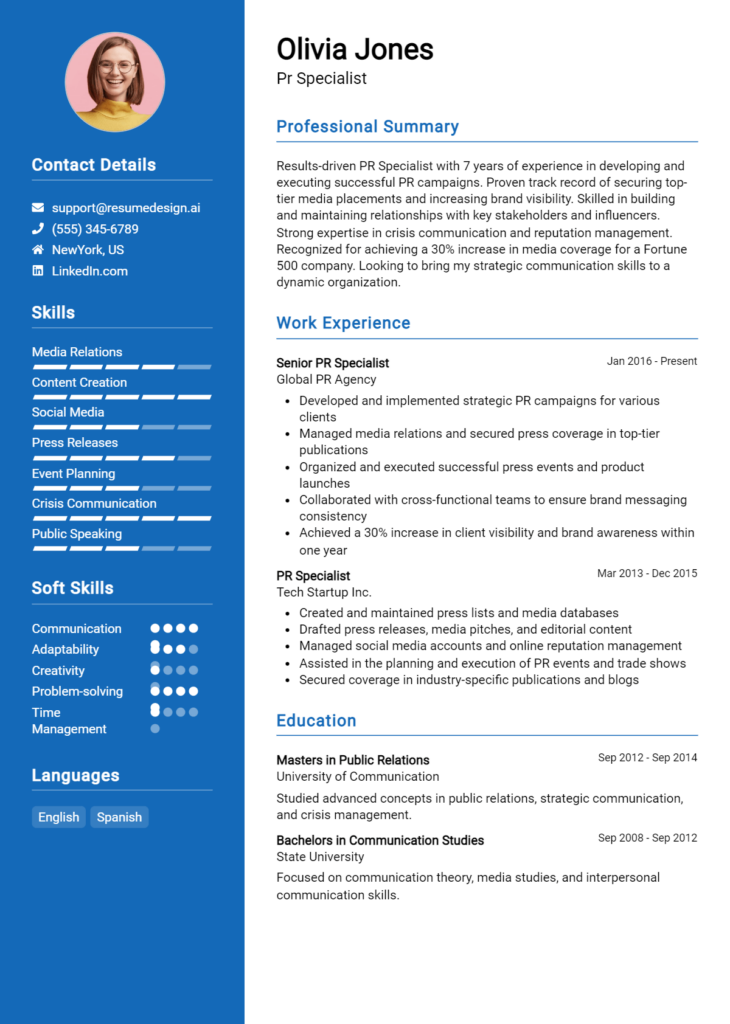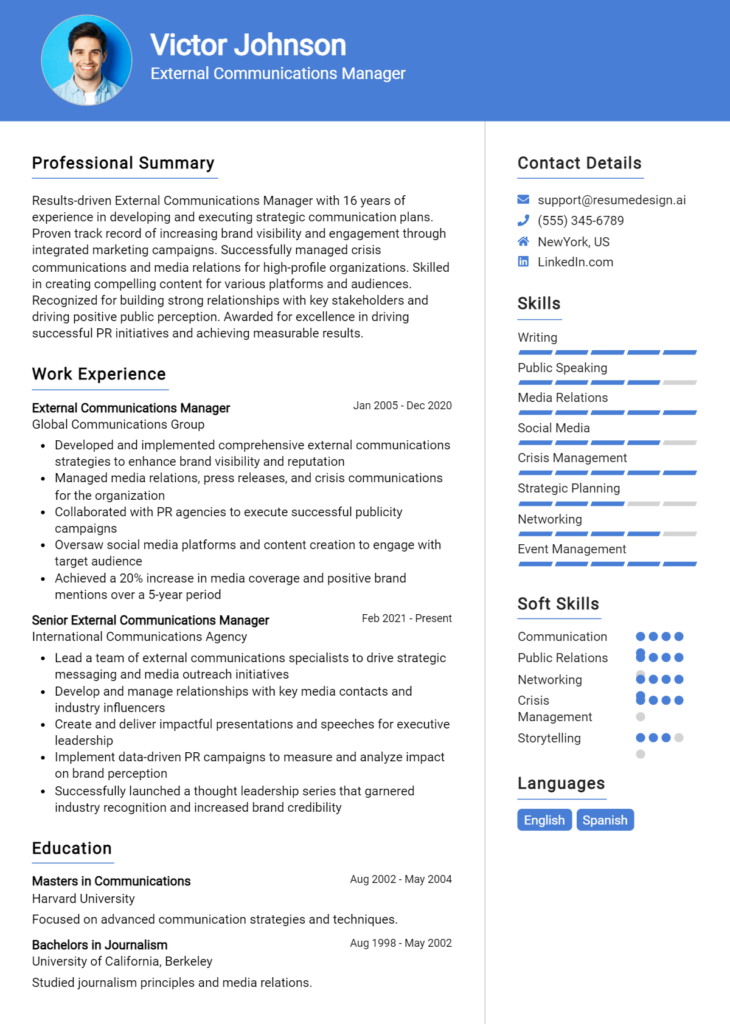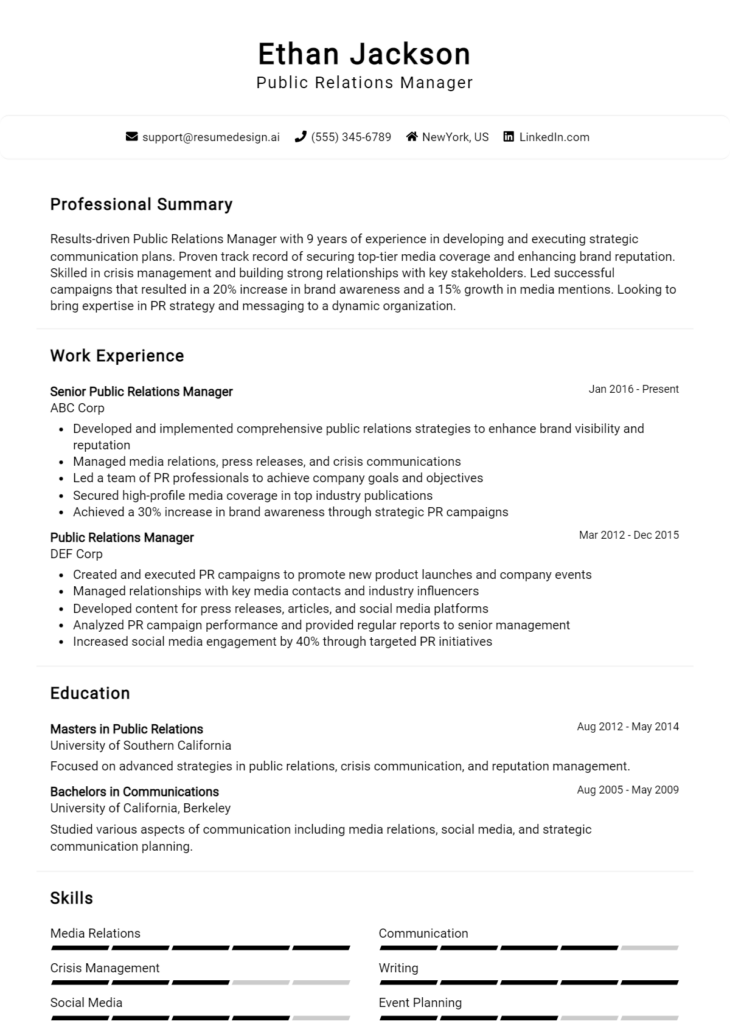Media Relations Specialist Core Responsibilities
A Media Relations Specialist plays a crucial role in bridging communication between an organization and the media. Key responsibilities include crafting press releases, managing media inquiries, and developing communication strategies that align with organizational goals. Essential skills for this role encompass strong writing, technical proficiency in digital media tools, and effective problem-solving abilities to navigate complex situations. These competencies enhance collaboration across departments, ensuring cohesive messaging and fostering positive relationships that ultimately drive the organization's success. A well-structured resume highlighting these qualifications is vital for standing out in this competitive field.
Common Responsibilities Listed on Media Relations Specialist Resume
- Developing and executing media outreach strategies
- Writing and distributing press releases and media alerts
- Building and maintaining relationships with journalists and media outlets
- Monitoring media coverage and analyzing public sentiment
- Coordinating press events and media briefings
- Responding to media inquiries and managing crisis communications
- Collaborating with internal stakeholders to gather information
- Creating media kits and promotional materials
- Tracking and reporting on media metrics and outcomes
- Staying updated on industry trends and news relevant to the organization
- Training staff on effective media communication techniques
- Implementing social media strategies to enhance media relations
High-Level Resume Tips for Media Relations Specialist Professionals
In today's competitive job market, a well-crafted resume is essential for Media Relations Specialist professionals looking to make a lasting impression on potential employers. Your resume serves as your first introduction, showcasing not just your skills and experiences but also your ability to communicate effectively—an essential trait in this field. It must reflect your unique achievements and how they align with the needs of the organization you wish to join. This guide will provide practical and actionable resume tips specifically tailored for Media Relations Specialist professionals, helping you to stand out in a crowded applicant pool.
Top Resume Tips for Media Relations Specialist Professionals
- Tailor your resume for each job application by incorporating keywords from the job description.
- Highlight relevant experience in media relations, public relations, and communications, focusing on specific roles that align with the job you're applying for.
- Quantify your achievements using metrics, such as the number of media placements secured, increases in brand awareness, or successful campaigns executed.
- Showcase industry-specific skills, such as knowledge of media channels, crisis communication, and content creation strategies.
- Include professional development activities, such as workshops, certifications, or memberships in relevant organizations.
- Utilize a clean and professional layout, ensuring that your resume is easy to read and visually appealing.
- Incorporate a strong summary statement at the top that encapsulates your expertise and career goals.
- Provide links to relevant work samples, such as press releases, media kits, or published articles that demonstrate your capabilities.
- Focus on results-oriented language, using action verbs to describe your contributions and impact.
By implementing these tips, you can significantly enhance your resume and increase your chances of landing a job in the Media Relations Specialist field. A well-structured resume that effectively communicates your skills and achievements will not only capture the attention of hiring managers but also position you as a strong candidate who understands the nuances of effective media relations.
Why Resume Headlines & Titles are Important for Media Relations Specialist
In the competitive field of media relations, a Media Relations Specialist must not only possess exceptional communication skills but also know how to market themselves effectively. A well-crafted resume headline or title is crucial as it serves as an immediate hook for hiring managers, summarizing a candidate's key qualifications in a single impactful phrase. By presenting a concise and relevant headline, candidates can highlight their expertise and make a strong first impression, ensuring they stand out among a sea of applicants. Titles should be directly related to the job being applied for, encapsulating the candidate's unique value proposition while inviting further exploration of their resume.
Best Practices for Crafting Resume Headlines for Media Relations Specialist
- Keep it concise: Aim for 10-15 words that clearly convey your expertise.
- Be specific: Tailor your headline to reflect the specific role you are applying for.
- Highlight key skills: Include core competencies that align with the job description.
- Use impactful language: Choose strong action verbs and industry-specific terminology.
- Reflect achievements: Mention notable accomplishments or experiences that set you apart.
- Stay relevant: Ensure your headline is directly related to media relations and public relations.
- Consider your audience: Write with the hiring manager in mind, addressing their needs and expectations.
- Update regularly: Refresh your headline as your skills and experiences evolve or as you apply for different positions.
Example Resume Headlines for Media Relations Specialist
Strong Resume Headlines
Dynamic Media Relations Specialist with 5+ Years of Proven Success in Crisis Communication
Results-Driven Public Relations Expert Specializing in Strategic Media Campaigns
Award-Winning Media Relations Professional with Expertise in Digital Communication Strategies
Innovative Communications Specialist Skilled in Building Media Partnerships and Enhancing Brand Visibility
Weak Resume Headlines
Experienced Professional Seeking Opportunities
Media Relations Specialist Looking for a Job
The strong resume headlines are effective because they articulate specific strengths and experiences relevant to the role of a Media Relations Specialist, immediately conveying the candidate's value to potential employers. They utilize powerful language that reflects competence, achievements, and a clear understanding of the job requirements. In contrast, the weak headlines fail to impress due to their vagueness and lack of specificity; they do not provide any substantial information about the candidate's qualifications and come across as generic, making it difficult for hiring managers to see the unique value the candidate could bring to their organization.
Writing an Exceptional Media Relations Specialist Resume Summary
A well-crafted resume summary is crucial for a Media Relations Specialist, as it serves as the first impression for hiring managers. This concise section of your resume quickly communicates your key skills, relevant experience, and notable accomplishments, ensuring you stand out in a competitive job market. A strong summary not only captures attention but also sets the tone for the rest of your application, making it essential to tailor it specifically to the job for which you are applying. By highlighting your unique qualifications and aligning them with the employer's needs, you increase your chances of making a lasting impact.
Best Practices for Writing a Media Relations Specialist Resume Summary
- Quantify achievements: Use numbers, percentages, and specific outcomes to showcase your impact.
- Focus on skills: Highlight key skills that are particularly relevant to media relations, such as communication, strategic planning, and crisis management.
- Tailor the summary: Customize your resume summary to reflect the specific job description and company values.
- Keep it concise: Aim for 2-4 sentences that deliver maximum information without overwhelming the reader.
- Use action verbs: Start sentences with dynamic verbs to convey confidence and proactivity.
- Highlight relevant experience: Mention specific roles or projects that demonstrate your expertise in media relations.
- Showcase industry knowledge: Indicate familiarity with the media landscape and trends to position yourself as a knowledgeable candidate.
- Be authentic: Use a tone that reflects your personality while remaining professional and focused.
Example Media Relations Specialist Resume Summaries
Strong Resume Summaries
Dynamic Media Relations Specialist with over 5 years of experience driving successful public relations campaigns that increased brand awareness by 40%. Adept at fostering relationships with key media personnel and crafting compelling narratives that resonate with target audiences.
Results-driven media professional with a proven track record of securing coverage in top-tier publications. Successfully managed crisis communications during a major product recall, mitigating negative press and restoring public confidence within 30 days.
Strategic communicator with expertise in digital media, having increased social media engagement by 150% in one year through targeted outreach and innovative content strategies. Skilled in building and maintaining media relationships that enhance brand visibility.
Weak Resume Summaries
Media Relations Specialist with experience in public relations looking for a new opportunity. Good communicator with some experience in managing media.
Experienced in media relations and public affairs, seeking to leverage skills in a new position. Knowledgeable in various media tools and practices.
The strong resume summaries are considered effective because they are specific, quantify achievements, and directly relate to the Media Relations Specialist role, showcasing the candidate's impact and expertise. In contrast, the weak summaries lack detail, provide generic information, and fail to highlight the candidate's unique qualifications or measurable successes, making them less compelling to potential employers.
Work Experience Section for Media Relations Specialist Resume
The work experience section of a Media Relations Specialist resume is critical as it serves as a platform to demonstrate the candidate's technical skills, leadership abilities, and capacity to deliver high-quality results. This section not only outlines previous roles and responsibilities but also highlights quantifiable achievements that showcase the candidate's effectiveness in managing media relationships and campaigns. Aligning past experiences with industry standards is essential to convey professionalism and relevance, making it easier for potential employers to assess the candidate's fit for the role.
Best Practices for Media Relations Specialist Work Experience
- Utilize specific metrics to quantify achievements, such as percentage increases in media coverage or engagement rates.
- Highlight technical skills relevant to media relations, including proficiency in media monitoring tools and analytics software.
- Emphasize successful collaboration with cross-functional teams, showcasing teamwork in executing media strategies.
- Clearly articulate your role in projects and campaigns to demonstrate leadership and initiative.
- Tailor your experience to align with job descriptions, emphasizing skills and achievements that match industry needs.
- Use action verbs to convey impact and demonstrate proactive contributions to media relations efforts.
- Incorporate industry jargon appropriately to reflect familiarity and expertise in media relations practices.
- Provide context for achievements to help employers understand the significance of your contributions.
Example Work Experiences for Media Relations Specialist
Strong Experiences
- Increased brand media coverage by 40% within one year through targeted press releases and strategic media outreach.
- Led a cross-functional team of 5 in developing a comprehensive media strategy for a product launch, resulting in 100+ media placements and a 30% rise in customer inquiries.
- Implemented a new media monitoring system that improved reporting efficiency by 50%, allowing for more timely and informed decision-making.
- Developed and maintained relationships with over 100 key journalists, enhancing the company's reputation and visibility in industry publications.
Weak Experiences
- Responsible for writing press releases and managing media.
- Worked on media strategies for various projects.
- Helped with team meetings and discussed media outreach.
- Involved in media relations tasks as needed.
The examples provided illustrate the stark contrast between strong and weak experiences. The strong experiences are characterized by quantifiable outcomes, clear leadership roles, and specific collaboration efforts, which effectively convey the candidate's impact in previous positions. Conversely, the weak experiences lack detail and do not quantify achievements or demonstrate significant contributions, making them less compelling to potential employers.
Education and Certifications Section for Media Relations Specialist Resume
The education and certifications section of a Media Relations Specialist resume is crucial for showcasing a candidate's academic background and professional development. This section not only highlights relevant degrees but also emphasizes industry-recognized certifications and continuous learning efforts. By providing detailed information about relevant coursework, certifications, and specialized training, candidates can significantly enhance their credibility and demonstrate alignment with the job role. A well-crafted education and certifications section reflects a commitment to the field and an understanding of current industry standards, which can be a deciding factor for potential employers.
Best Practices for Media Relations Specialist Education and Certifications
- Prioritize relevant degrees in communications, public relations, or journalism.
- Include industry-recognized certifications, such as APR (Accredited in Public Relations) or PRSA membership.
- Detail relevant coursework that aligns with media relations, such as media law, crisis communication, and digital marketing.
- Highlight any specialized training or workshops attended, especially those focusing on media tools and strategies.
- Ensure names of institutions and dates of completion are clearly presented for credibility.
- Consider adding GPA or honors if they reflect strong academic performance relevant to the field.
- Update this section regularly to include the latest qualifications and training.
- Format the section for clarity, making it easy for hiring managers to scan for key information.
Example Education and Certifications for Media Relations Specialist
Strong Examples
- Bachelor of Arts in Communication, University of California, Berkeley, 2021
- Accredited in Public Relations (APR), Public Relations Society of America, 2022
- Certificate in Crisis Communication, Harvard University Extension School, 2023
- Relevant Coursework: Media Ethics, Strategic Communications, Digital Media Strategies
Weak Examples
- Associate Degree in General Studies, Community College, 2018
- Certificate in Graphic Design, Online Course, 2021
- Bachelor of Science in Biology, University of Florida, 2019
- Outdated Certification: Basic Microsoft Office Training, 2017
The strong examples are considered effective as they directly relate to the skills and knowledge required for a Media Relations Specialist, showcasing relevant degrees and certifications that demonstrate expertise in the field. In contrast, the weak examples are deemed ineffective because they lack relevance to media relations, indicating a disconnect from the core competencies and knowledge areas that hiring managers seek. Such qualifications may not resonate with the expectations for the role and could detract from the candidate's overall appeal.
Top Skills & Keywords for Media Relations Specialist Resume
A Media Relations Specialist plays a crucial role in shaping and maintaining a positive public image for an organization. In this fast-paced industry, possessing the right skills is paramount for success. A well-crafted resume highlighting both hard and soft skills can significantly enhance a candidate's visibility to potential employers. As communication is the backbone of media relations, showcasing your proficiency in relevant skills not only demonstrates your qualifications but also your ability to navigate the complexities of media interactions effectively. Whether you are cultivating relationships with journalists or crafting compelling press releases, a balance of technical expertise and interpersonal abilities is essential.
Top Hard & Soft Skills for Media Relations Specialist
Soft Skills
- Excellent verbal and written communication
- Strong interpersonal skills
- Critical thinking and problem-solving
- Adaptability and flexibility
- Strategic planning and execution
- Attention to detail
- Creativity and innovation
- Time management and organization
- Team collaboration and support
- Negotiation and persuasion
Hard Skills
- Media monitoring and analysis
- Press release writing
- Social media management
- Public speaking and presentation
- Crisis communication strategies
- Event planning and coordination
- Knowledge of media law and ethics
- Content creation and editing
- Familiarity with PR software and tools
- Data analysis and reporting
For a deeper understanding of how to showcase your abilities, explore skills relevant to media relations. Additionally, don't forget to highlight your work experience to give context to your skills and demonstrate your impact in previous roles.
Stand Out with a Winning Media Relations Specialist Cover Letter
I am writing to express my enthusiasm for the Media Relations Specialist position at [Company Name]. With a robust background in communications and public relations, combined with my passion for storytelling, I am excited about the opportunity to contribute to your team. My experience in developing strategic media campaigns and fostering relationships with key media personnel has equipped me with the skills necessary to effectively promote [Company Name]'s brand and initiatives.
In my previous role at [Previous Company Name], I successfully managed media outreach for several high-profile campaigns, resulting in a 30% increase in media coverage within a year. I pride myself on my ability to craft compelling press releases and engaging content that resonates with journalists and their audiences. My proactive approach to media engagement has not only built valuable relationships but has also positioned my previous employer as a thought leader within the industry. I am confident that my strategic mindset and strong writing skills will allow me to effectively elevate [Company Name]'s message across various platforms.
Collaboration is a cornerstone of my work ethic. I have a proven track record of partnering with cross-functional teams to ensure cohesive messaging and brand representation. By understanding the unique goals and challenges of different departments, I can create tailored media strategies that align with overall business objectives. I am particularly drawn to [Company Name] because of its commitment to innovation and community engagement, and I am eager to leverage my skills to help amplify your vision and mission.
I am excited about the opportunity to bring my expertise in media relations to [Company Name] and contribute to your ongoing success. Thank you for considering my application. I look forward to the possibility of discussing how my background and skills align with your needs.
Common Mistakes to Avoid in a Media Relations Specialist Resume
When crafting a resume for the role of a Media Relations Specialist, it's crucial to present your skills and experiences effectively. However, many applicants make common mistakes that can hinder their chances of landing an interview. Understanding and avoiding these pitfalls can significantly enhance the quality of your resume and showcase your qualifications more convincingly. Here are some frequent mistakes to steer clear of:
Generic Objective Statement: Using a one-size-fits-all objective statement can make your resume feel impersonal. Tailor your objective to reflect your passion for media relations and how you can contribute to the specific organization.
Overly Complicated Language: While it's important to demonstrate your expertise, using jargon or overly complex terms can confuse readers. Aim for clear and concise language that communicates your skills effectively.
Neglecting Keywords: Failing to include relevant keywords from the job description can result in your resume being overlooked by applicant tracking systems (ATS). Analyze the job listing and incorporate essential terms naturally within your resume.
Lack of Quantifiable Achievements: Many candidates list responsibilities without showcasing their achievements. Use metrics and specific examples to illustrate your impact, such as successful media campaigns or increases in media coverage.
Inconsistent Formatting: A cluttered or inconsistent resume format can distract from your qualifications. Ensure uniformity in font style, size, and bullet points to create a professional appearance.
Ignoring the Target Audience: Not considering the audience of your resume can lead to misaligned messaging. Tailor your content to reflect the interests and needs of potential employers in the media relations sector.
Typos and Grammatical Errors: Submitting a resume with spelling or grammar mistakes can reflect poorly on your attention to detail. Always proofread your document or have someone else review it before submission.
Omitting Relevant Experience: Some candidates may downplay or overlook experiences that are pertinent to media relations, such as internships or volunteer work. Highlight all relevant experiences that demonstrate your skills in communication and relationship building.

